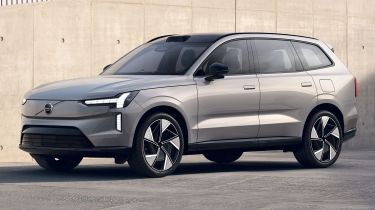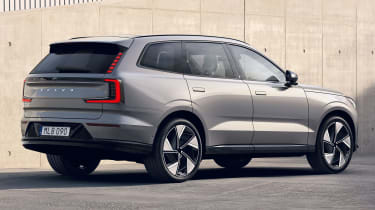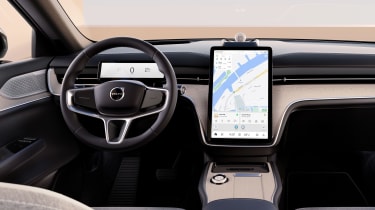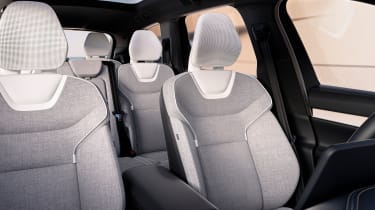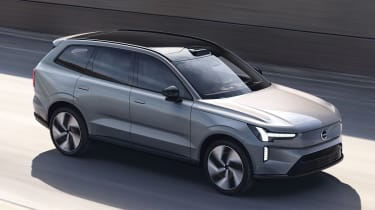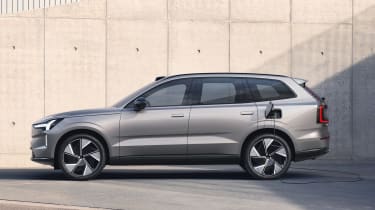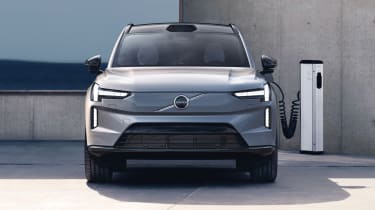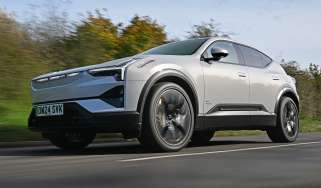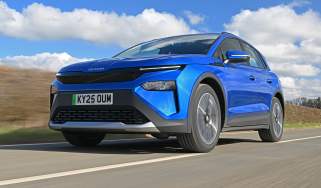Volvo EX90 electric seven-seat SUV: range, specs and prices
The XC90’s all-electric replacement will arrive in 2024, loaded with the latest safety and driver assistance systems; prices start from £96,255 at launch
Behold: the all-new, all-electric Volvo EX90. As well as being the direct replacement for the Swedish brand’s flagship seven-seat XC90, the new EX90 serves as a rival to the likes of the Tesla Model X, Mercedes EQS SUV and BMW iX, plus the incoming Kia EV9 and Range Rover EV.
The EX90 is still a seven-seater, and carries over the XC90’s boxy, square-jawed shape, but there are some giveaways that this is the fully electric model. For starters, there’s the blanked-off grille flanked by an evolution of Volvo’s signature ‘Thor’s Hammer’ headlight design. Then, mounted at the top of the windscreen you have the LiDAR sensor for the EX90’s advanced driver assistance systems, but more on that later.
The rear of the EX90 is very simple with just C-shaped taillights that extend onto the tailgate, some additional lighting either side of the back window, a small roof spoiler and the traditional Volvo lettering. Aerodynamics have also played a part in the EX90’s design, with flush door handles, aero wheels and active shutters in the front bumper designed to help reduce drag and improve efficiency on the road.
Volvo EX90 range, performance, battery and charging
The Volvo EX90 uses the same SPA2 platform as the recently unveiled Polestar 3 SUV, and comes with similar powertrain options at launch. For the moment, every EX90 is powered by a 107kWh usable battery which feeds two electric motors – one on each axle – for all-wheel drive.
However, there are two power outputs available. The standard ‘Twin Motor’ setup produces a total of 402bhp and 770Nm of torque, while the EX90 Twin Motor Performance boosts power to 510bhp and 910Nm of torque. The power increase cuts the EX90’s 0-62mph from 5.9 seconds in the base car to 4.9 seconds, but both versions have the same 112mph top speed.
Range for the Twin Motor and Twin Motor Performance models in Ultra trim (the only specification available at launch) stands at 363 miles and 360 miles respectively. For context, those figures are on par with other flagship electric seven-seater SUVs like the Mercedes EQS SUV (366 miles) and Tesla Model X (348 miles).
Volvo has confirmed it plans to introduce an entry-level version of EX90 somewhere down the road, which we expect to be fitted with a smaller battery or rear-wheel drive only, however the Swedish carmaker hasn’t revealed any details just yet.
When it comes to charging, like the Polestar 3, the EX90 can be topped up from 10-80% in less than half-an-hour if you use an ultra-rapid charger capable of 250kW speeds or faster. Fully recharging the 107kWh battery pack from a home wallbox is likely to take around 17 hours.
Every EX90 is fitted with a heat pump that’s designed to help warm the cabin more efficiently. The EX90 also features the hardware to enable bi-directional charging, for powering electrical devices or other EVs using the car’s battery, but it’s not enabled at the moment.
Drivers will be able to use the Volvo Cars app to find nearby charging points, as well as pay for and monitor charging sessions. You even use the built-in navigation system to check the availability of charging points in real-time before you stop for a top-up. The EX90 also supports Plug and Charge, which allows you to simply plug the car into certain chargers and charging will begin automatically, with payment taken care of as well.
Interior and practicality
Modern Volvos already had a fairly minimalist interior, but the EX90 takes things a step further by ditching all but one physical control – a volume dial on the centre console. The heart of the cabin, and where you’ll control all of the car’s functions, is the 14.5-inch central touchscreen that runs a new Google-powered infotainment system. Google Maps and Google Assistant are built-in, but more apps are available through the Google Play store. And for all the iPhone users out there, wireless Apple CarPlay comes as standard along with Android Auto connectivity.
The central screen does display a number of shortcut buttons for the climate controls, but at the bottom of the central touchscreen is a separate “contextual bar” that suggests different functions depending on whether you’re driving, parked or on a phone call. Volvo claims the system will learn over time, better understanding what individual drivers want or will use, with further improvements possible via over-the-air updates.
The EX90 also gets a nine-inch digital driver’s display behind the steering wheel, head-up display and a 25-speaker reference-quality Bowers & Wilkins sound system with Dolby Atmos and speakers integrated into the car’s headrests. With the EX90, your smartphone serves as the key, automatically unlocking the car and starting a personal welcome sequence as you approach. Individual personal profiles will load automatically as you get in.
Volvo says 48kg of recycled plastics and "bio-based materials", plus responsibly sourced wood among other sustainable materials are spread throughout the EX90 cabin. You won't find any leather inside, as Volvo announced in 2021 that its new electric cars won't feature any cowhide. Instead, there is a wool blend upholstery option. There are seven unique interior themes for buyers to choose, which coordinate the upholstery and interior trim colours.
At just over five metres long, the EX90 is longer than the XC90 it replaces, but being an EV it’s also much heavier, weighing in at over 2.8 tonnes. There’s 310 litres of boot space on offer with all seven seats in place, 655 litres if you fold away the rearmost seats and a whopping 1,915 litres with just the front two seats left up.
There’s an extra 34 litres of storage space under the EX90’s bonnet for your charging cables and other stuff, too. Plus, both versions of the EX90 have a 2.2-tonne maximum towing capacity.
Technology and safety
Volve being one of the safety-conscious carmakers it is, the EX90 unsurprisingly comes with an extensive list of safety systems, which are fed by an array of five radars, eight cameras and 16 ultrasonic sensors. The new flagship EV also comes as standard with LiDAR technology, which stands for “light detection and ranging”.
We saw LiDAR technology recently in the Lotus Eletre. It uses laser light to scan the road ahead and detect objects, the benefits of which are that it works at motorway speed, during the day and at night, unlike a camera-based system which requires light. Therefore, LiDAR offers more levels of protection regardless of driving conditions.
Volvo says its LiDAR can pick up a tyre lying in the road up to 120 metres ahead of the car, or even spot pedestrians up to 250 metres down the road. In fact, Volvo claims with LiDAR accidents with severe outcomes can be reduced by up to 20%, with overall crash avoidance improved by 9%.
This LIDAR technology, combined with other sensors and cameras around the car, allow for other safety systems like pedestrian detection and lane keep assist, plus convenience features, such as surround-view when parking and semi-autonomous adaptive cruise control. Volvo even says the EX90 is technically hardware-ready for unsupervised autonomous driving in the future.
The EX90 also features two cameras inside, trained on the drive, to monitor concentration, drowsiness and attention levels. If it detects you’re not paying full attention the car will alert, slowly become more insistent. But if you did fall asleep or became ill while driving, the EX90 is able to safely stop and call for help.
Prices and equipment
At launch, the EX90 is available exclusively in Volvo’s range-topping Ultra trim level. Every EX90 comes as standard with the aforementioned LiDAR and driver monitoring systems, 25-speaker Bowers & Wilkins HiFi, 14.5-inch touchscreen, a head-up display, wireless Apple CarPlay, air suspension, pixel LED headlights, panoramic glass roof, soft-close doors, four-zone climate control, recycled fabric upholstery, 22-inch alloy wheels and servicing for up to three years/60,000 miles, whichever comes first. Not to mention, seven seats, the dual-motor powertrain and 107kWh usable battery.
Buyers do get a choice of seven paint colours and four interior themes. Plus, Volvo has a plethora of practical accessories for the EX90 including roof boxes, bike carriers, a pet cover for the rear seats and even a dog harness, some of which are available as part of ‘special value packs’.
Prices for the EX90 Twin Motor in Ultra trim start from £96,255 or £1,599 per month on a Care by Volvo subscription, meanwhile the Twin Motor Performance model in the same spec comes in at £100,555 or £1,669 via the subscription plan.
As we mentioned there is an entry-level version of the EX90 in the works, but the price tags for the first EX90 variants as they stand are on par with similarly equipped versions of the BMW iX and Lotus Eletre, while significantly undercutting the seven-seat Mercedes EQS SUV’s over £129,000 starting price.
However the EX90’s current starting price is roughly £10,000 more than you’ll pay for a plug-in hybrid Volvo XC90 Recharge with all the bells and whistles. The XC90 PHEV is going to remain on sale in the UK alongside the fully electric EX90 for some time – for customers who aren’t quite ready to make the switch to electric.
Order books for the Volvo EX90 will open in 2023, with production taking place in the US starting at the end of the year and eventually China, too. First UK customer deliveries are expected to arrive in the first quarter of 2024.
Future Volvo electric car plans
The EX90 is the first in a new generation of electric Volvos, with the Swedish brand announcing it will unveil one new EV every year before it becomes an electric-only brand in 2030.
Volvo has already teased the arrival of a baby electric SUV in 2023, most likely called the EX30 and based on the same underpinnings as the new Smart #1. The company has also trademarked the names EX60, EX40, ES60, ES90, EV60 and EV90, potentially for use on zero-emissions versions or replacements for its other SUVs, saloons and estate cars.
Aside from new models, the brand has already revealed that its third generation of EVs will have their battery packs integrated into the floor for improved efficiency and vehicle stiffness. Volvo announced in 2021 that it's working with Swedish battery company Northvolt to develop lithium-ion battery packs that are 50% more energy-dense than those used in its current electric cars.
Using this technology, Volvo is targeting ranges of up to 621 miles from its production electric cars before 2030. Volvo also estimates that charging times will be cut in half by 2025 thanks to improvements in battery technology, electric cars’ software and charging technology.
Recommended

EV Deal of the Day: budget-friendly Ford Capri for just £234 a month

EV Deal of the Day: practical Vauxhall Grandland Electric for only £199 per month
Most Popular

EV Deal of the Day: budget-friendly Ford Capri for just £234 a month

